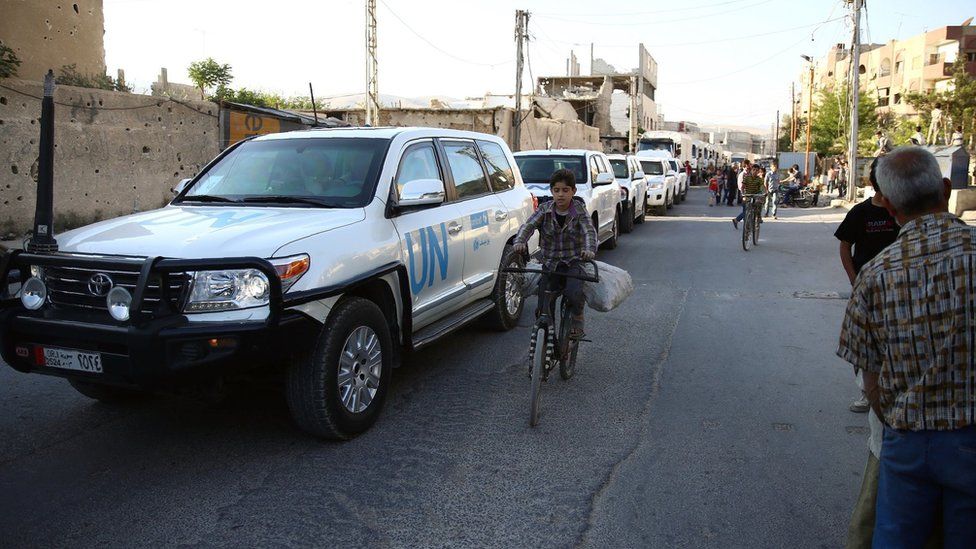Syria conflict: Report says UN has lost impartiality
- Published

The United Nations has been accused of breaching its principles in the Syrian conflict by effectively letting the government control aid deliveries.
More than 50 humanitarian, human rights and civil society groups back a report that says the UN has given in to demands not to help rebel-held areas.
This has contributed to thousands of civilians' deaths, the report alleges.
The UN said the report "discredits the work of national and international humanitarian aid workers".
"The UN has never shied away from calling out the parties in the conflict, including the Syrian government, for hampering the humanitarian work of the UN in Syria," Stephane Dujarric, Secretary General Ban Ki-moon's spokesman, told the Associated Press.
More than 250,000 people have been killed and 11 million others have been displaced since the uprising against President Bashar al-Assad began in 2011.
'Culture of compliance'
The report on the UN's activities was published on Wednesday by the Syria Campaign, which describes itself as a global advocacy group campaigning for a peaceful and democratic future for Syria, and was based on more than 50 interviews with aid workers.
Inside the besieged suburb of Darayya
The report documents what it describes as a "serious breach of the humanitarian principles of impartiality, independence and neutrality".
At the very start of the uprising, the reports says, the Assad government threatened to remove the UN's permission to operate within Syria and withdraw visas for its non-Syrian staff if agencies attempted to deliver aid to the government-besieged southern city of Deraa.
"The Syrian government has used this threat consistently since then to manipulate where, how and to whom the UN has been able to deliver humanitarian aid," it adds.
Rather than setting out red lines or conditions for their co-operation with the government, UN agencies "chose to accept the government's constraints" and a "culture of compliance was born", the report claims.
The report says this has provided the government with an effective veto over aid deliveries to rebel-held areas, enabling it to use sieges as a weapon of war.
In April, only 12% of food aid delivered from Damascus went to territories outside the government's control, according to the World Food Programme.
Children explain how it feels to live under siege by government forces.
"The Syrian government knows there is no sanction for denying access to territories it does not control. It will continue to receive billions of dollars in UN aid regardless," the report says.
As a consequence, thousands of civilians in government-besieged besieged areas have died of malnutrition-related causes and lack of medical treatment, and hundreds have starved to death, some minutes away from the hotel where many UN aid workers are based in Damascus, according to the Syrian Network for Human Rights.
Roger Hearn, former head of the UN agency for Palestine refugees in Damascus, said: "There has been a systematic failure in the UN-led response. Rather than basing its response on need, it has developed into a billion-dollar response programme that is largely controlled by the regime and its proxies."
The UN Office for the Coordination of Humanitarian Affairs (OCHA) stressed that the UN did not assist people based on their location, but on their needs.
The UN did not direct any aid to the government, with aid delivered through a network UN agencies and NGO partners in Syria, the OCHA said. The UN placed a premium on trying to increase access and protection in Syria by all available means, it added.